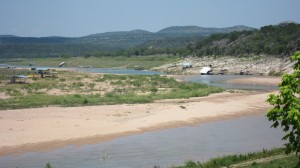Texas Community Without Water Still Waiting For a Solution

Photo by Jeff Heimsath/StateImpact Texas
Longtime resident L.J. Honeycutt says he knows water rates will go up soon for his community.
SPICEWOOD, Texas — Many people who retired in Spicewood Beach came here for the water — the boating, fishing, and the summer days they imagined their grandkids would spend swimming in Lake Travis. In this small community less than an hour outside of Austin, the Fourth of July used to mean eating barbecue at picnic tables on the shore and launching motorboats and Jet Skis from the boat ramp. But as the holiday approaches this year, the town’s mood seems more worried than celebratory, and the boat ramp ends in the sand, not water.
In only three years, the lake has steadily dried to the point where it resembles a creek at its northern end. On some parts of the shore, fishing docks are beginning to slide toward the lakebed. Boat docks in nearby Chimney Cove sit high and dry, far from the shallow water at the bottom of the lake. Residents can drive their golf carts from the browned lakeside golf course down onto dusty trails that were once deep below the water.
Early last year, Spicewood Beach became the first Texas town to run out of water during the current drought. Since then, the Lower Colorado River Authority (LCRA), which owned and managed the community’s water system, has been trucking approximately 32,500 gallons of water per day to the small community, and an extra 6,500-gallon truckload on weekends. Spicewood Beach has been under Stage Four watering restrictions for over a year, meaning that residents are not allowed to conduct any outdoor watering.

Photo by Holly Heinrich/StateImpact Texas
A fish dock sits high and dry in Spicewood Beach. The community has been without a working well for a year and a half.
Spicewood Beach residents’ water supply was diminished by a severe, statewide drought in 2011, compounded by large releases of water from the Highland Lakes that were sent to farmers downstream. The LCRA also sold at least 1.3 million gallons of the town’s well water to private contractors before the well failed.
The watering restrictions were expected to end late this summer, when the LCRA said a new water treatment plant would be finished. But now, it is not likely to be completed until November, according to Corix, the Vancouver-based private company that is constructing the plant and will eventually take over Spicewood Beach’s water system from the LCRA.
Why will the plant be completed later than expected? According to Darrin Barker, the Texas-based utility operations manager for Corix and a former LCRA employee, obtaining required permits and approvals from the Texas Commission on Environmental Quality (TCEQ), the LCRA, and the U.S. Army Corps of Engineers added about three months to the process. Burnet County also applied for a $350,000 grant from the Texas Department of Agriculture to help build the system, which took additional time but was “very much worth it,” Barker said. The grant should reduce the cost of the plant that would otherwise be calculated into Spicewood Beach residents’ future water rates.
This particular water system is also technologically complex, according to Barker. The intake pipe must be able to draw water from a section of Lake Travis that is currently only four feet deep. However, the system must also be flexible enough to pump groundwater from the community’s ailing wells, if the drought breaks and rainwater recharges the aquifer.
“This is a difficult project, from a technological standpoint, from an economic standpoint,” Barker said. “There’s not a lot of room to work with. This effort is to try to find a reliable water supply to work with, and [one] that is as affordable as can be.”

Photo by Holly Heinrich/StateImpact Texas
Low lake levels caused the water well in Spicewood Beach to fail in January 2012.
Reviewing sites, developing engineering plans, obtaining government approvals, and constructing treatment plants often requires this amount of time, according to Jack Touhey, Corix’s vice president of Public and Government Affairs.
“I know it’s a real challenge for the residents there,” Touhey said. “It’s just that projects like these take this type of time to get along, although we have tried to accelerate it as much as possible.”
Residents have concerns that their water rates will go up once the company takes over the plant from the LCRA, although it remains to be seen what the actual rates will be. Touhey said that Corix will wait a year before changing the community’s water rates. New rate estimates will not be calculated until the company has evaluated the operating costs and capital expenditures required during the first year, he said.
“I know the rates are going to go up,” said Spicewood Beach resident L.J. Honeycutt, who moved to the town in the 1980s. “It’s just a matter of how much. I’m hoping that if they try to jump too high, we can get everybody on this system to go down and flood the state [with protest] and put a stop to it.”
If Corix later decides to raise rates, the company would have the option to do so, at least temporarily. Under Texas law, private water providers can charge higher interim rates before a rate increase has been approved by the state, but if the increase is not approved, they are required to compensate customers. During the recent legislative session, lawmakers passed legislation transferring oversight of water rates from the TCEQ to the Public Utility Commission (PUC), with the expectation that the PUC will be able to process applications more quickly.
For now, Spicewood Beach residents must wait another five months for a water treatment plant. As the drought goes on, weeds grow high around the local fishing dock, and the bottom of the lake is being slowly overtaken by sand and snakes. They pray for rain, Heller says, but except for a few light summer showers, none has come.
“I know it’s all in God’s plan, somehow,” Heller said, looking out at the lake from her parents’ front porch. “But it gets frustrating. Sitting here on the porch, you could see the water all the way up to the cabanas. Now, you can’t see it at all. It’s not even ankle-deep down there. It looks like a ravine, doesn’t it?”
Holly Heinrich is a reporting intern for StateImpact Texas.

